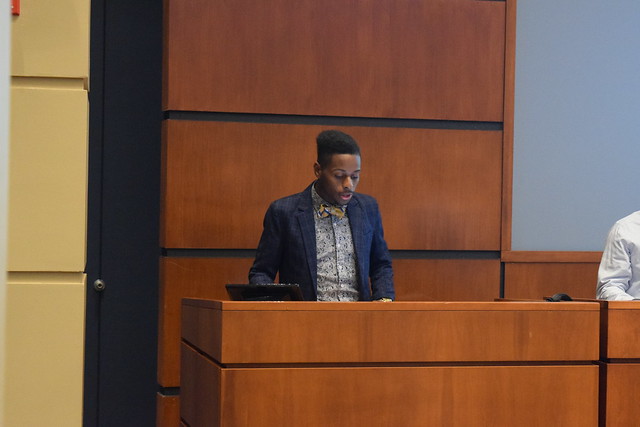On Oct. 23, Bob Vedra of Industrial Opportunity Partners hosted “Increasing Value through Enhancing Operations.” The event was the fifth in this semester’s Robert K. Wilmouth Speaker Series, a number of lectures hosted by NDIGI designed to further students’ knowledge of the science and art of investing. The objective of the event was to teach the audience about the role of private equity in the finance industry, and explain the day-to-day operations of a private equity firm.
Bob Vedra is a Senior Managing Director and a Founding Principal of Industrial Opportunity Partners (IOP). He has 19 years of domestic and international transaction experience, including the carve-out of corporate orphans, recapitalization of family-owned businesses, and acquisition of bankrupt companies. At IOP, he co-manages the operations of the fund, in addition to sourcing and executing transactions and managing portfolio investments. Prior to founding the firm, Vedra served as a managing director of Wynnchurch Capital, a Chicago private equity firm, and in the merchant banking group of GE Capital. He graduated from the University of Notre Dame with high honors before earning his MBA with high distinction from the University of Michigan.
What is Private Equity?
Vedra began his discourse by explaining what exactly the ‘often misunderstood’ private equity industry is. Private equity, said Vedra, “is about operations. It’s about understanding how to create value in a company and how to fundamentally make these better industries.”
He stated the best way to understand private equity is to look at the two components of the name. Private equity is made up of private securities that are not and cannot be publicly traded. Equity simply refers to the capital of the invested companies.
Fund Structure
Vedra continued on to discuss the structure of a typical private equity fund. The fund is made up of two parties: the private equity partner, known as the general partner (GP), and the institutional investor (such as an endowment) that commits capital. This investor is known as the limited partner, or LP. He explained that “the vast majority of capital for PE funds comes from the limited partner, but the general partner is expected to put dollars to work as well.”
The typical compensation structure of a private equity fund is known as the ‘two and twenty structure.’ IOP and other private equity firms typically charge an initial management fee of 2%, which will step down over the duration of the investment. They also charge an additional 20% of any profits earned.
Acquiring Companies
The job of the general partner, when acquiring a company, is “to go out and market what you think you can get them [how you think you can grow their company] with your specific strategy, and that specific strategy is different for each deal. You have to tailor it to the individual company.” Vedra emphasized that different strategies for different companies mean that no two deals will have exactly the same targets, but typically IOP targets 3x return of invested capital and 30% IRR.
“There’s a specific process for each prospective investor,” said Vedra. “They want to know how you work as an investor, and how you work as a manager. They, understandably, want to see you as a good steward of their money.”
How do Limited Partners Review a General Partner’s Performance?
He then spoke on how a private equity firm’s performance is evaluated. Limited partners typically use two key statistics. The first is known as ‘return of invested capital’ or ‘cash-on-cash.’ This statistic essentially states, he said, “If I give you ten dollars, and get twenty back, my return of invested capital is 2x.” The second statistic is internal rate of return (IRR) which estimates how profitable an investment will be. “There’s multiple measures of IRR,” said Vedra, “including realized and unrealized, and gross and net. Gross IRR does not take into account management fees and carried interest, whereas net subtracts these from IRR. Limited partners are almost always interested in net.”
About Industrial Opportunity Partners
Vedra then discussed more specifically his own firm, Industrial Opportunity Partners. IOP was founded in 2005 and is based in Evanston, Illinois. The firm is currently comprised of 19 professionals. They [the firm] focus on acquiring and managing middle-market manufacturing and value-added distribution companies, typically with revenues between $30 million and $400 million.The firm has $910 million in committed capital and over $2 billion in portfolio company revenue. Vedra stated that “IOP believes having an operating focus and a very specific thesis on how you’re going to change the way this company operates to generate value is important. We look at where a company is today, and ask where they can be tomorrow.”
He stated that IOP is comprised of both operations and transaction professionals, which is important because of the variety and sheer number of transactions the company sees––up to 500 a year. “You need to have a filter,” he explained. “You need to ask is there something fundamentally interesting about this company?”
Case Studies
Vedra concluded his presentation with two case studies on different invested companies in IOP’s portfolio. The purpose of these case studies was to demonstrate some specific ways in which a private equity firm operates, and for students to uncover where the opportunity for growth in the company was, such as in a failed management team or over-leveraged balance sheet.
For more information about Industrial Opportunity Partners, visit their website here.
